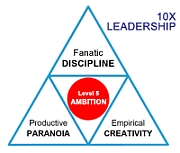In Great by Choice, chapter six: SMaC starts with a quote: Most men die of their remedies, and not of their illnesses.” –Moliere 
It’s a particularly unnerving realization of exactly what the recovery process is like with a bone marrow transplant, as it is with business. In bone marrow transplant I’ve been advised that (GVHD) Graft Versus Host Disease is challenging, yet most of the patients who fail to recover die from other circumstances.
An example of this is from a friend of ours whose brother-in-law had a bone marrow transplant. Two months ago he went into the hospital with an infection in his PIC line. He never came out, dying about three weeks later. He’d been progressing well up till then.
His death reminds me how important it is to remain committed to the principles of Strategic Discipline. Just because you’re making progress doesn’t mean you can relax. The environment and market place is in constant change. Army War College in Carlisle, Pennsylvania [The School for Generals it’s termed] coined an acronym for an environment in flux: VUCA, for volatile, uncertain, complex and ambiguous. It applies aptly to today’s business landscape. In my case it aptly describes the environment surrounding me as I transform my bone marrow transplant body from low immunity to the normal level it needs to be at.
Great by Choice notes that 10Xers (10X are companies Collins identified as high-performing study cases with the moniker "10X" because they didn't merely get by or just become successful. They truly thrived. Every 10X case beat its industry index by at least 10 times.) develop a SMaC recipe. These are a set of durable operating practices that create a replicable and consistent success formula.
The difference in the 10Xers from the comparison companies is their fanatic discipline. The clarity and specificity of a SMaC recipe helps people keep their bearings and sustain high performance when in extreme conditions. When faced with declining results, 10xers do not assume that their principles and methods have become obsolete. Rather they first consider whether the enterprise has perhaps strayed from its recipe, or has forgone discipline and rigor in adhering to the recipe. If so they see the remedy in reconnecting with the underling insights behind the recipe and reigniting passion for adhering to it. They ask, “Is our recipe no longer working because we’ve lost discipline? Or is it no longer working because our circumstances have fundamentally changed?”
So what is SMaC? SMaC stands for Specific, Methodical, and Consistent. If you’re in an uncertain, fast-changing, and unforgiving environment, the more you need SMaC. SMaC is a set of durable operating practices that create a replicable and consistent success formula. It is clear and concrete, enabling the entire enterprise to unify and organize its efforts, giving clear guidance regarding what to do and what not to do. SMaC recipe reflects empirical validation and insight about what actually works and why.
Let’s look at an example from 1979 Southwest Airlines and Howard Putnam’s 10 points of their SMaC: 
- Remain a short-haul carrier, under two-hour segments.
- Utilize the 737 as our primary aircraft for ten to twelve years.
- Continued high aircraft utilization and quick turns, ten minutes in most cases.
- The passenger is our #1 product. Do not carry air freight or mail, only small packages which have high profitability and low handling costs.
- Continued low fares and high frequency of service.
- Stay out of food services.
- No interlining ... costs in ticketing, tariffs and computers and our unique airports do not lend themselves to interlining.
- Retain Texas as our #1 priority and only go interstate if high-density short-haul markets are available to us.
- Keep the family and people feeling in our service and fun atmosphere aloft. We’re proud of our employees.
- Keep it simple. Continue cash-register tickets, ten-minute cancellation of reservations at the gate in order to clear standbys, simplified computer system, free drinks in Executive service, free coffee and donuts in the boarding area, no seat selection on board, tape-recorded passenger manifest, bring airplanes and crews home to Dallas each night, only on domicile and maintenance facility.
Choosing what not to do so you can concentrate on what you are extremely good at separates you from your competition. It also tells your customer what you are good at opening up a whole range of promises that you can deliver to differentiate yourself from your competitor.
Do you have a SMaC recipe for your business? Is it because you were unaware or simply because you wish to remain mediocre that you’ve not established them?
We’ll explore SMaC and other valuable lessons from Great by Choice in upcoming blogs.






.jpeg?width=150&height=135&name=Hand%20with%20marker%20writing%20the%20question%20Whats%20Next_%20(1).jpeg)

